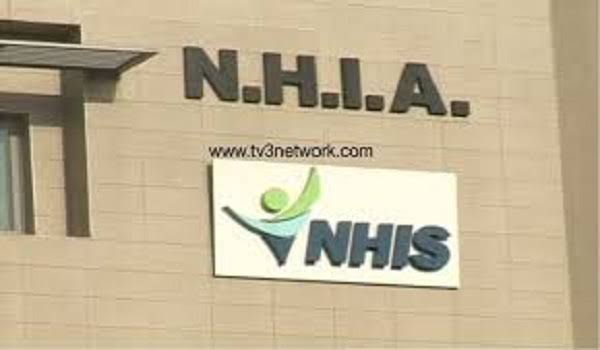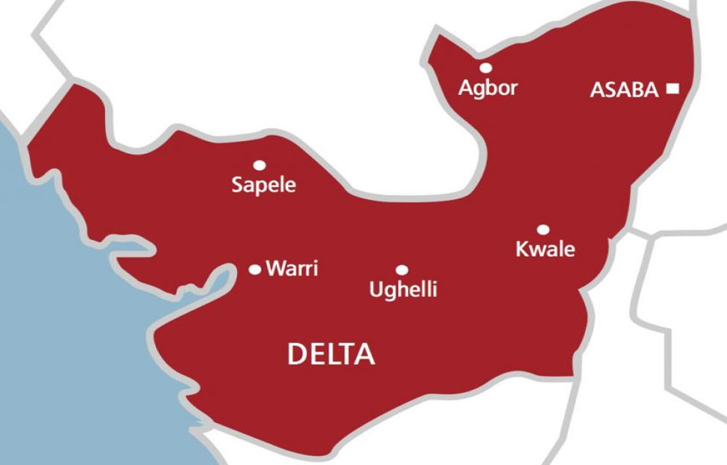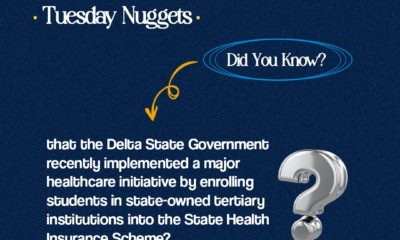Health
NHIA Harnesses New Act To Regulate Service Providers, HMOs

The National Health Insurance Authority (NHIA) has highlighted that the recently enacted National Health Insurance Act has granted the authority enhanced regulatory powers over service providers, including health facilities and Health Maintenance Organisations (HMOs).
These measures aim to safeguard the interests of individuals enrolled in the insurance scheme.
Simultaneously, the NHIA is urging the public to embrace the new GIFSHIP policy scheme, which ensures that every Nigerian has access to health insurance.
It is worth noting that President Muhammadu Buhari signed the NHIA Bill into law on May 19, 2022. This Act replaces the previous National Health Insurance Scheme (NHIS) Act and mandates health insurance for all Nigerians.
During the Ikeja Stakeholders Forum held at NECA House in Ikeja, Mr. Olufemi Akingbade, the Lagos Zonal Coordinator of the NHIA, announced that the authority is in the process of developing a digital system that will greatly streamline billing and settlement procedures.
He stated that the introduction of this system aims to ensure a seamless experience by providing easy access to registration, medical records of enrolees, and settlement claims, thereby minimizing the potential for disputes.
Furthermore, Akingbade disclosed that the NHIA is currently transitioning from a semi-manual operation to a digital platform, signifying the authority’s commitment to leveraging technology for enhanced efficiency and service delivery.
“We are developing a system that will actually take it from that beginning of registration, retrieval when you get to the hospital so that there will be no issue of bringing your ID card.
“In each hospital, we will have a terminal that once you give them your NHIA number, it calls up your data. Along the way, whatever you pass through at the hospital will be recorded, which is the Electronic medical record. With it, dealing with medical records will be easy.
“This is because if you have been treated with malaria and we have a code for malaria treatment, there is a price that is fixed for that malaria treatment, such that once they click the code, the price will come out. It is not something that anybody can dispute. When the billing gets to HMO, there will not be any dispute. In terms of claims management; also, the system will take care of everything from registration, electronic medical records and also claims payment”.
During the stakeholders forum, Dr. Bethuel Kasimu Abraham, the Lagos State Coordinator of NHIA’s Ikeja Office, highlighted that the act has empowered the authority to take punitive actions against health facilities and HMOs that engage in any form of misconduct or violation.
He further stated that Previously, the NHIA had limited authority to sanction stakeholders within the scheme.
Health
Global Experts Tackle Stroke Management Crisis With Training In Asaba

Experts consider that stroke is a growing health crisis in Nigeria, affecting thousands of lives every year.
To tackle this challenge, the World Stroke Organization (WSO), Stroke Action Nigeria, Federal Medical Centre (FMC) Asaba, Asaba Specialist Hospital (ASH), and FMC Onitsha joined forces for an intensive four-day training program. Their mission? To equip healthcare workers with the skills to prevent, detect, and treat strokes more effectively.
The program brought together leading stroke specialists from around the world, including WSO President Prof. Jeyaraj Pandian, former WSO President Prof Sheila Martins, Dr. Rita Melifonwu, CEO of Stroke Action Nigeria and Board Member of the World Stroke Organisation, and other experts from Nigeria, India, Canada, Rwanda, and the UK. Through hands-on training and expert-led sessions, healthcare workers learned best practices for recognizing stroke symptoms, responding in emergencies, and providing life-saving care.
ALSO READ: 2027: Okpebholo Assures Tinubu With Snatch Of 17 LG Chiefs From PDP
Dr. Emmanuel Ezunu, Chief Consultant Neurologist at FMC Asaba, stressed the urgency of the training, saying, “Stroke is the leading cause of disability worldwide and the second leading cause of death. We all need to work together to reduce the burden of stroke. This training is a crucial step to ensure our health workers are well-equipped to handle every stage of stroke care.”
The training sessions took place simultaneously in multiple locations, including FMC and ASH in Asaba as well as in Onitsha, Anambra. Dr. Francis Ugoeze, Lead for the Research Study Recruitment and Implementation Team, warned about the rising risks among young people due to poor lifestyle choices. “It’s important to watch what we eat, avoid junk food, smoking, and hard drugs, and stay active,” he advised.
Dr. Melifonwu emphasized that stroke is not just a health crisis but a preventable one. “One in four adults over 25 is at risk. We need more awareness and lifestyle changes to reduce stroke cases,” she said. She also shared plans to establish ‘Life After Stroke’ centers in Nigeria, offering much-needed support for survivors, especially those struggling financially.
Dr. Chiamaka Okereke, a consultant neurologist and member of the research team, highlighted how these efforts are about more than just education—they’re about saving lives. “If more people recognize stroke symptoms early and seek medical help immediately, we can prevent many unnecessary deaths and disabilities,” she explained.
Experts at the event also called on the government to take action by increasing public awareness and investing in stroke care facilities. They emphasized the need for acute stroke units and post-stroke rehabilitation centers to provide patients with the care and support they need to recover.
This initiative represents a major step toward a future where stroke is no longer a leading cause of disability and death in Nigeria. With greater awareness, improved healthcare training, and better facilities, countless lives can be saved.
Health
Nigeria Strengthens Airport Screenings Amid Spread Of China’s HMPV Virus

The Nigerian government has increased surveillance at major international airports in response to the outbreak of Human Metapneumovirus (HMPV), recently discovered in China and now spreading to several countries, including India, Hong Kong, Malaysia, and Kazakhstan.
Port health officers have begun screening arriving passengers for symptoms of the virus, following a directive from the Minister of Health, Muhammad Ali Pate.
According to a source at Murtala Muhammad International Airport (MMIA), Lagos, “There is no cause for alarm as the Port Health Service has been mandated to start screening the passengers, and we are not taking anything to chance.”
The Human Metapneumovirus has sparked global concern after over 5,000 hospitalisations were reported in the United Kingdom due to respiratory infections linked to the virus.
READ MORE: Speed Darlington Sues IGP For N300M Over Unlawful Detention
The Nigeria Centre for Disease Control and Prevention (NCDC) has issued an advisory to monitor global developments in collaboration with the Ministry of Health and Social Welfare. Dr Jide Idris, Director-General of the NCDC, stated, “We aim to provide timely, accurate information and guidance to keep the Nigerian public informed and prepared.”
The agency also debunked rumours that the World Health Organization (WHO) had declared HMPV a Public Health Emergency of International Concern (PHEIC), urging the public to disregard such claims.
Screenings have commenced at key airports, including MMIA, Lagos, and Nnamdi Azikiwe International Airport, Abuja. Despite the heightened precautions, the Nigeria Civil Aviation Authority (NCAA) has yet to issue a formal circular to airlines on mandatory passenger checks.
The surge in respiratory infections globally has heightened pressure on health systems. In the UK alone, flu cases rose sharply over the holiday period, with over 5,000 hospitalisations reported by December 29, 2024. There has also been an increase in hospitalisations linked to COVID-19, norovirus, and RSV.
As global temperatures drop and respiratory infections continue to rise, Nigerian authorities remain vigilant, aiming to prevent the spread of HMPV within the country.
Health
Africa Leads Global Progress In HIV/AIDS Fight, Says WHO
Africa has made remarkable progress in reducing new HIV infections and AIDS-related deaths, according to the World Health Organization (WHO).
Dr. Matshidiso Moeti, WHO Regional Director for Africa, highlighted these achievements in her statement to mark this year’s World AIDS Day, themed “Take the Rights Path: My Health, My Right” on Friday.
READ ALSO: Atiku Gloats Over AUN’s Achievements Ahead Of 20th Anniversary
For the first time in 2023, the number of new HIV infections outside sub-Saharan Africa surpassed those within the region, underscoring Africa’s significant progress.
The continent is also a global leader in advancing the 95-95-95 UNAIDS targets aimed at ensuring 95% of people living with HIV know their status, 95% of those diagnosed are on treatment, and 95% of those treated achieve viral suppression.
“Seven countries have already achieved the targets, with the overall rating for the region currently at 90-82-76,” said Dr. Moeti. “About 21.3 million people are now on antiretroviral treatment, raising their life expectancy.”
Botswana and Namibia were recognized for achieving significant milestones in preventing mother-to-child HIV transmission, earning silver and bronze tier statuses, respectively, under WHO’s Path to Elimination of HIV initiative.
African countries are also adopting innovative prevention methods, including oral and long-acting injectable pre-exposure prophylaxis (PrEP) and the dipivefrine vaginal ring.
Dr. Moeti stressed that while these tools are vital, their impact depends on accessibility.
“The value of these innovations depends on their universal accessibility,” she stated, emphasizing the need for investments and policy reforms.
Dr. Moeti called for an end to stigma and discrimination, which she said continue to hinder progress.
“We have a collective obligation to protect human rights, specifically ensuring that health care is available to everyone, without any discrimination, regardless of their HIV status, background, gender, or where they live. Stigma and discrimination cannot be allowed to undermine the gains and impede our progress.”
While celebrating these advancements, Dr. Moeti noted that disease outbreaks across the region pose a challenge to already overburdened health systems.
She emphasized the importance of strong, integrated, and person-centered health care systems to meet the needs of vulnerable populations.
“Let’s take this opportunity today to acknowledge the progress, but to also renew our joint commitment to eliminating HIV.
By protecting everyone’s right to health, and reducing new HIV infections, we can achieve an AIDS-free generation and ensure the sustainability of the HIV response,” she urged.
Dr. Moeti also highlighted the crucial role of communities in shaping strategies to eliminate barriers to care.
“We must ensure their voices are heard,” she said, emphasizing that the collective efforts of governments, partners, civil society, health care providers, and communities are essential in the fight against HIV/AIDS.













